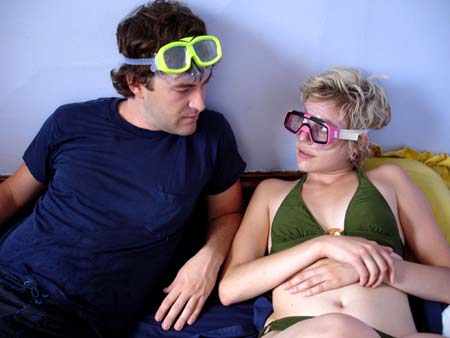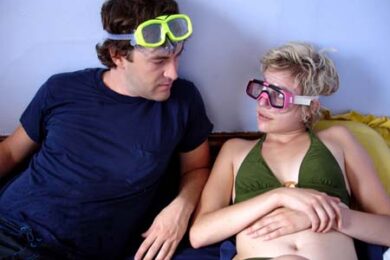Joe Swanberg made quite an impression at last year’s London Film Festival with his latest work Nights and Weekends, which is about the trials of a couple in a long-distance relationship. This strikingly naturalistic film was actually filmed ‘long-distance’ with Joe and collaborator Gretta Gerwig spliting their time between their respective homes in Chicago and New York.
Joe’s films are often associated with the so called ‘mumble-core’ movement: a group of american filmmakers whose low-budget and low-fi films generally focus on relationships in post-university life and are frequently featured at the SXSW festival. But while the cohesiveness of this ‘movement’ is debatable, what is truly compelling about Joe’s generation of American filmmakers is their commitment to working on their own terms, completely outside the mainstream, even side-stepping the Hollywood funded ‘Indywood’ studios and the Sundance Film Festival which are independent in name only. Joe in particular is known for his improvosational approach to dialogue, even allowing his actors to influence the plot, and his frank and often graphic depictions of sex.
Hannah Takes the Stairs was in many ways Joe’s breakthrough film and features acting turns from many of his filmmaking peers. The ICA will also be screening Joe’s second feature LOL which explores the impact of the internet and new communications technology on male sexuality.
The Quietus: How did you first get into film?
"I sort of started in freshman year of high school, or at least that’s when the idea first crossed my mind. I can be pretty single minded when I get excited about something, which is not to say that I don’t have other interests. I’m really seriously thinking of going back to school and studying maths or physics. I’ve been reading these science books like A Brief History of Time and thinking that this stuff is so interesting and important. I’d love to be sitting down doing maths problems; figuring out the distances between galaxies and discovering the nature of black holes. My education, however, was so based around film that I wasn’t really exposed to it. I finally took a physics course in my senior year of college and I really loved it and felt stupid for not being more open minded. I’d really like to combine my interests – make documentaries or something – but knowing me it’s a bad idea to mix the two. The thing that keeps me excited about making films is exploring people. I relate to films in a very specific way – a way that involves characters and relationships."
How did this focus on characters and relationships develop?
"I guess it started with the movie I made after film school. It was this really small project which I shot with my little brother and his friends and that was the first thing I was really proud of. The stuff I did in film school didn’t really do it for me. I was trying to work through a lot of film student ideas. The reason that movie worked so well was that I went in with no plan and just focused on these kids, my brother and his friends, and made a movie about who they are with no big, overarching ideas."
For a lot of filmmakers dealing with everyday subject matter and using DV are necessities in terms of budget, but you and many of your peers have continued working in that way even when you are presented with other options. How would your process change if you got funding?
"I would really want to make a film in the exact same way. I might be interested in doing something different but only if it’s really different. The thing that scares me the most, and I think would be the worst idea, would be to make something similar to what I’m making now but just with more money and more crew. I don’t want to complicate things in that way. If the movies got bigger, I would much rather do a horror movie or an action movie, something I haven’t done before. It would be interesting to have freedom to play around with those tools, but as long as it’s small movies about characters, I only need a small crew, I only want to shoot a few scenes a day. I’m really happy with the process I’ve been developing. I’m feeling prouder and prouder of the work."
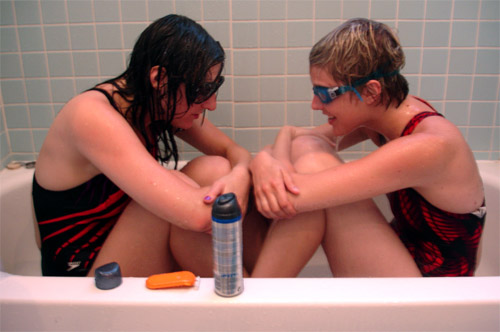
You normally use your friends and colleagues as your actors but you mentioned you might be working with Jennifer Jason Leigh on your next project. How would your process change when working with professional actors?
"Hopefully not too much. I don’t think the process really necessarily has to change, but as a filmmaker I would have so many more options because [Jennifer]’s talented enough that, basically anything we could talk about she could do. When I’m working with non-professionals so much of the process is about building the characters around exactly who they are so that they don’t have to reach to far outside their normal personality. With someone like Jennifer or Jane [Adams] (Happiness and The Wackness), who I just worked with on this last movie, I am amazed with their ability to take the things I say and immediately put that out there for me to capture."
"I’ve been getting there with some other people. I think Greta [Gerwig] (Hannah Takes the Stairs and Nights and Weekends) is one of the most talented people working today. She’s got an amazing natural talent and also she’s been making movies for a few years now and is getting really good. We could talk about a scene where I wanted a certain kind of emotion from her and she could get there right away. I’ve always been really hesitant about opening up heavy emotions with non-professionals. I couldn’t just tell a non-actor to break down and cry, which is a dumb example because I don’t do that in my films."
What are the advantages in using non-professionals?
"There are huge advantages because you don’t have a relationship to these people outside of the movie. With somebody like Jennifer who has been in so many movies and embodied so many characters you always are aware that you’re watching a famous actress. Even when you watch a movie with amazing performances you still can’t completely forget. When you work with non-professionals who haven’t been in anything before they embody that role and you only really know them as that character. There’s also a raw kind of energy you can feel."
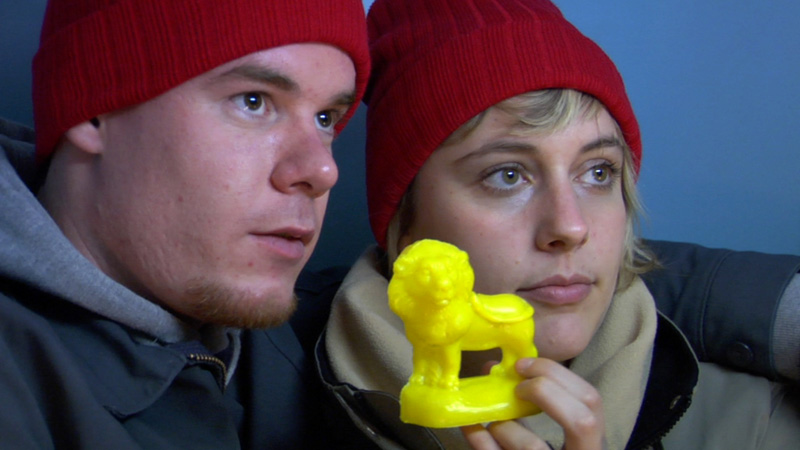
What is the potential of the documentary-like realism of your films. Can it be a kind of social commentary or do you want to somehow teach people about themselves?
"When you go into a book store, there are all these sections and one of them is self help, which is a pretty big section. Films have historically always been put into just a few categories drama, comedy, thriller and then stuff like avant garde or experimental. But there is room for other big categories. I think with most of the movies I’m making, I want people to watch them and feel less alone in the world — to feel that other people have experienced things that they have experienced. That was very much the case with my first film Kissing on the Mouth, we wanted to fill it with lots of weird things so people would think "OK. I’m not the only person. I’m not totally crazy." I’ve never lost the desire to create that kind of recognition. As a film-goer that’s what I respond to most when I’m watching a movie: when something happens and I have totally said those words or I’ve absolutely been in that situation before. It’s the same as a good conversation when you say something and they’re like "yes exactly you know what I’m talking about."
That’s something that books also do really well. What are your favourite books?
"One I go back to again and again is Don DeLillo’s White Noise. It really makes me think long and hard about death. For a week after I just walk around thinking "I’m going to die. That’s going to happen." Another one I keep returning to is Charles Bukowski’s Post Office. That writing is the same as my movies in some regard in that he’s documenting his own experience. Of course there are artistic liberties being taken but otherwise he is just taking the stuff that was most interesting to him, the best bits, and condensing that."
"I always respond to autobiography even if it’s autobiography veiled with a character. I really like Jeffrey Brown’s comic work like Clumsy and Unlikely which is an autobiography about his relationships. There’s another graphic novel I read this year called Fun Home by Alison Bechdel which totally blew me away. It’s the most like a novel of any graphic novel and her writing is incredible. I love the images too and they add so much but even without them… Lolita is another of my favourites."
It seems like what a lot of the books you’ve mentioned have in common is that they avoid moralising. Does it bother you when films take strong moral stances?
"It does bother me but here’s the thing – I’m a very judgemental person, I have very strong opinions and I form them quickly, but movies have been a way to fight that tendency in myself. Spending a lot of time with characters who are sometimes doing despicable things it helps me get into people’s worlds and realise that they have their own reasons for doing things."
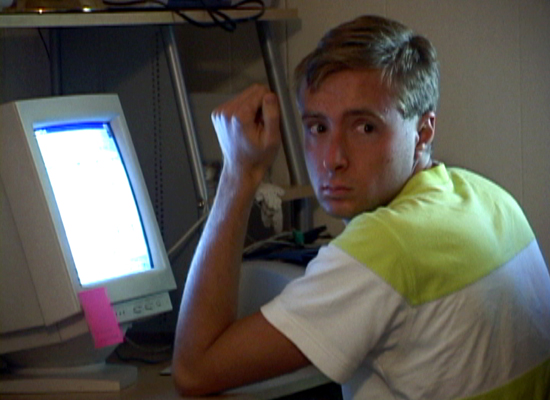
The second half of Nights and Weekends seems to be very much from the girl’s perspective. Did that have to do with Gretta’s input into the film?
"I think its because I had stepped back a bit and had a clearer idea of the direction of that second half, much more so than the first half. And that direction didn’t involve so much of me. I started thinking of it more like a filmmaker, like I did with Hannah Takes The Stairs. I fell into this mode where I was fascinated by her – giving her scenes and things to do. It’s addictive to watch her work because she’s so talented."
Your second film, LOL is all about men but also seems sympathetic to the female perspective.
"Not everyone thought so. LOL is such a critique of masculinity so I was surprised to get that reaction from people. That doesn’t mean they’re crazy – obviously there’s something in the film they’re responding to which seems sexist to them, but from where I’m coming from, we really layed into the guys. The film is neither positive nor negative towards the women, its just not about them. I’ve always said you could make a film like LOL that was about female characters, but it should be made by a female director not by me. Politically its not my place to make films about women or say, poor African Americans. I’m the only person I can make accurate work about, which may be narcissistic and egoistic and everything. The only perspective I can have is my own but that perspective is still clouded. I don’t have a clear idea of myself but I think what makes the films interesting is that cloudiness: they way I view myself versus how I appear to other people. It’s that disconnect that makes the work watchable."
Hannah Takes the Stairs and LOL open on January 9 at the ICA.

